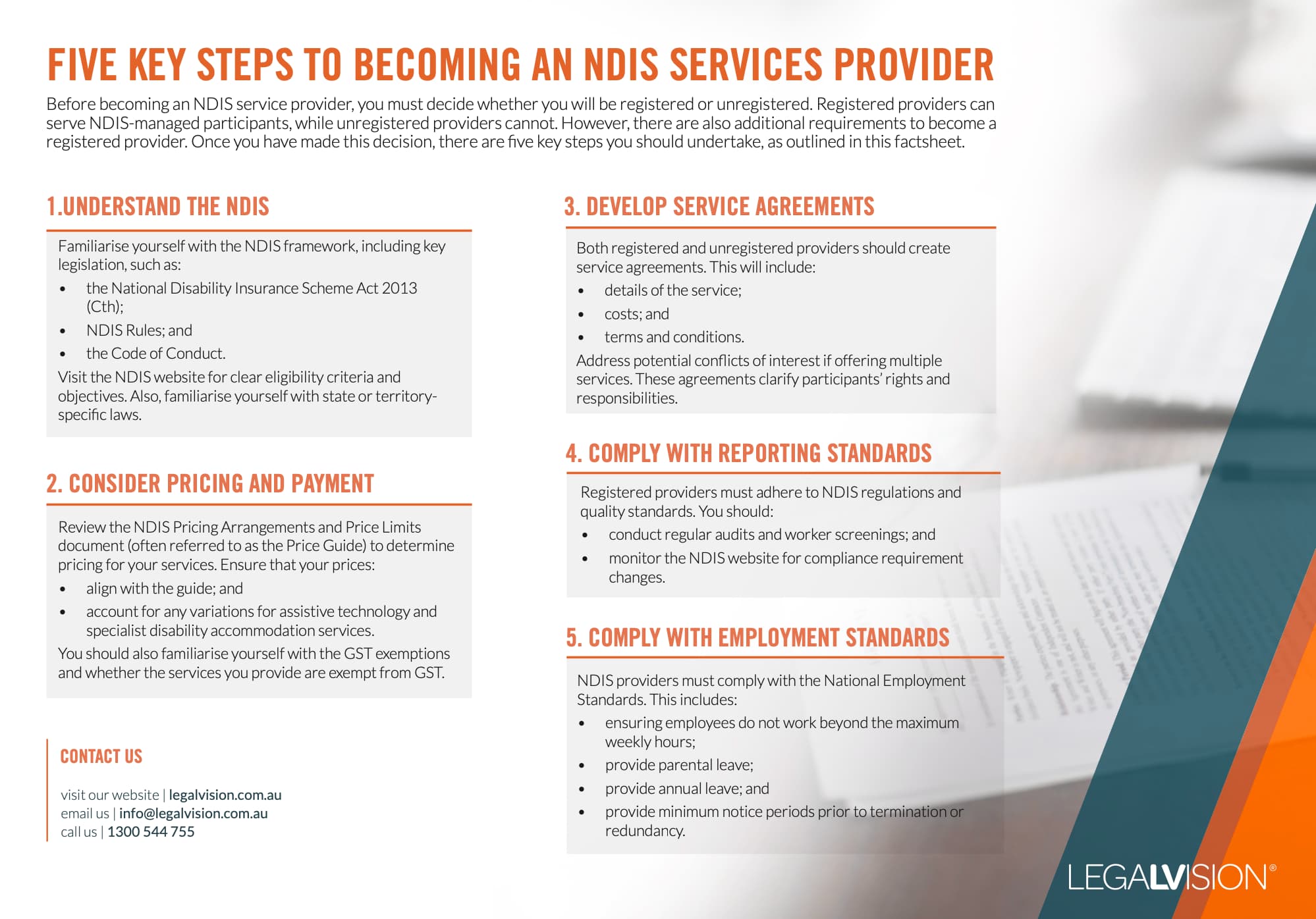Welcome, everyone, to our webinar on what makes a great Supported Independent Living (SIL) provider.
My name is Astrid, and I am a Senior Lawyer in LegalVision’s Commercial and Regulatory team. I am joined today by Nicole from MyCareSpace.
Nicole, can you please tell us a bit about yourself and MyCareSpace?
Nicole:
Okay, thanks, Astrid. Before I introduce myself, I’d like to thank our legal partner, LegalVision, for inviting us to partner on this very important webinar.
Good morning, everyone. As Astrid mentioned, my name is Nicole Gamerov, and I am the CEO and founder of MyCareSpace.
A bit about me first: My background is actually in the finance sector. But many years ago, my mum lost her vision to macular degeneration, and at the time, I decided I wanted to leave my career in finance and get involved in the disability sector. Fast forward seven years — MyCareSpace was founded after my mum struggled to find the support services she needed. Today, MyCareSpace supports thousands of people living with disabilities and service providers by connecting them to each other and to NDIS information.
I look forward to discussing this important topic with you. At the end, I’ll share how you can connect specifically with MyCareSpace and our team.
Over to you, Astrid.

Understand five key steps you should know to become an NDIS service provider with this free LegalVision factsheet.
Astrid:
Thanks, Nicole, for sharing your story. Before we begin, just a couple of quick housekeeping items:
You’ll receive the recording and slides in your email. You can also submit any questions if you haven’t already done so in the chat box, and we’ll answer them at the end.
We also ask that you please complete the feedback survey after the webinar.
Additionally, you’re all eligible to receive a free consultation with us to discuss how we can assist with your NDIS contracts or any of your legal needs. To request your free consultation, please provide your contact details via the survey that will appear at the end of the webinar.
You can also contact Nicole through MyCareSpace if you’d like to discuss how she can assist you.
Nicole will now begin by telling us a bit about what Supported Independent Living (SIL) is and providing an overview of today’s webinar.
Nicole:
Great! I think there’s a slide that prompts some of this. For those of you who don’t know, SIL stands for Supported Independent Living. If you can move to the next slide, please. SIL is a form of NDIS support, and under the new payment system, Pace, it will be called ‘Home and Living,’ not ‘Core.’
Participants funded for SIL are generally those with complex needs. If you’re thinking about delivering SIL, this is an important factor to consider. If you’ve never worked with people who have complex needs, this is something you need to factor in.
SIL can be delivered in various ways:
- In a participant’s own home.
- In a group or shared home.
- In partnership with Specialist Disability Accommodation (SDA).
Just to clarify, today’s webinar will not cover ILO (Independent Living Options) or SDA, although there may be some overlap.
In terms of successful SIL delivery, we’ll discuss this towards the end, but one key observation from working with thousands of providers is that delivering SIL successfully requires a wide range of skills. Hopefully, by the end of our webinar, you’ll be able to answer the question: Do I have these skills?
Astrid:
Thanks, Nicole. Now, I’m going to focus on the legal considerations for delivering SIL successfully. Nicole will cover the business considerations afterwards.
If you’re delivering SIL in a group home or where there are more than one participant, you need to consider the leasing arrangements.
If you’re leasing the property from a landlord, do you have the right to use the property for a business? Do you have the right to run a business from that property? Seeking advice on the lease you’ve signed is essential.
You also need an occupancy, boarding, lodging, or tenancy agreement with the participants. As you know, SIL funding only covers the services provided, not the rent, utilities, or food, which should be covered under separate agreements.
We recommend having leasing documents in place. This will vary from state to state and, depending on the number of participants, you may need to register as a boarding house or rooming house in some states. For example, if you have more than three or four participants, or if you have one participant, you might need to treat them as tenants in some states.
Having the right leasing and occupancy agreements will help minimise disputes and clarify your rights in case any issues arise, particularly if you need to terminate the agreement and ask the participant to move out.
In addition to your leasing and occupancy agreements, you also need service agreements. Although service agreements aren’t mandated by the NDIS, they’re recommended. If you’re claiming GST-free supplies, the ATO may require a service agreement. It’s also important to have a clear service agreement to define obligations, dispute resolution, invoicing, and terms around vacancies or when participants refuse services.
If you’re providing both SDA and SIL, you must disclose the conflict of interest.
Nicole:
Indeed, Astrid. We often see that providers don’t have proper service agreements in place, which can lead to problems down the track. Without clear documentation, you’re left in a vulnerable position when disputes arise. A strong service agreement is vital for minimising risk.
Astrid, now that you’ve covered leasing and service agreements, I’ll take over and talk about staffing, subcontracting, and privacy considerations.
Astrid:
Great! I’ll touch on subcontracting. If you’re using subcontractors to staff your SIL homes, you need robust subcontractor agreements. These should outline obligations, key performance indicators (KPIs), training requirements, and privacy obligations.
Remember, SIL often involves complex participants, so the subcontractors must have the necessary training to manage things like PEG tubes or complex behaviours. You’ll remain liable for any issues that arise with subcontractors, so it’s essential to ensure they meet the required standards.
Privacy is another important area, as participants are highly concerned about the confidentiality of their information. You must have policies and procedures in place to ensure your staff understand privacy obligations, especially regarding the sharing of sensitive information, such as health records.
You should also be aware of any additional state-specific privacy obligations, such as the Health Records Act in Victoria.
Nicole:
Exactly, Astrid. It’s crucial to ensure your subcontractors are fully aware of privacy laws and their obligations around maintaining confidentiality. If you don’t have clear agreements, it can lead to risks that could impact both your clients and your business.
Now, let’s discuss risk minimisation. From a staffing perspective, one of the best ways to minimise risk is to ensure your staff have the right qualifications and training. Training should be continuous, especially for those working with clients who have complex needs. This ensures you’re prepared for any issues that arise, and your staff are fully equipped to handle them.
When you’re working with multiple participants, it’s important to make sure you have the right support in place. You need a clear understanding of your participants’ needs and have the right staff available at all times.
Finally, remember that when you’re running a SIL service, you need to have risk management and safety plans in place, not just for your clients but also for your staff and the premises. These plans should include clear procedures for emergencies and risk mitigation.
Astrid:
Absolutely. Risk management is crucial. It’s also worth noting that when you’re offering SIL, you need to have a clear complaints process in place for both clients and staff. Disputes often arise when there’s a lack of clear communication or misunderstanding of expectations. A proper dispute resolution process can prevent costly legal disputes down the track.
Nicole:
Exactly. And that’s why we strongly recommend having a strong team in place. From a business perspective, this includes having the right staff, a clear understanding of SIL funding, and managing those funds correctly. It also includes ensuring you’re adhering to any state-based regulations and having the appropriate insurance coverage, such as professional indemnity, public liability, and workers’ compensation insurance.
Astrid:
Speaking of insurance, you should also consider cyber insurance. As a SIL provider, you’ll likely be collecting and storing sensitive personal information, so it’s essential to have protection in case of a cyber attack.
Nicole:
Yes, and when it comes to cyber insurance, it’s important to fully understand what’s covered. Many providers realise only when they need to claim that they aren’t fully covered. So, ensure your insurance covers all the bases, and don’t be afraid to ask questions when setting it up.
Astrid:
Before we move on to answering your questions, I’ll quickly touch on the importance of knowing your participants. You need to ensure that the person who is signing the agreements on behalf of the participant is authorised to do so. If a guardian or plan nominee is involved, ensure the agreement is signed by the correct person. Without this, you risk your agreement being unenforceable.
Finally, it’s important to have informed consent in place. This allows you to discuss the participant’s needs with their family, support coordinator, or plan manager.
Nicole:
Absolutely. And while we’ve discussed a lot of practical considerations, always keep in mind that SIL is about creating a safe, supportive, and respectful environment for your clients. Every decision you make should be with their well-being in mind.
Astrid:
Thanks, Nicole. Before we wrap up, we have a few questions. We’ve received one asking if it’s mandatory to register as a boarding house. It depends on the state and the number of participants. If you’re unsure, we can help clarify your requirements.
Nicole:
Exactly. It varies, and we’re happy to discuss that further.
Astrid:
Another question is about rent in SIL homes. As we mentioned, rent isn’t covered by NDIS funding and should be addressed in a separate agreement. If you need assistance with this, feel free to contact us.
Nicole:
Absolutely. And it’s crucial to ensure that rent, utilities, and food costs are treated separately in your agreements.
Astrid:
We’re almost out of time, but we’ll answer a few more questions. For now, if you’re interested in learning more, please fill out the survey that will appear at the end of the webinar. You’ll also have the chance to book a free consultation with us.
Nicole:
And if you’re considering offering SIL, feel free to reach out to MyCareSpace. We can help you connect with the right clients and provide guidance on how to build a successful SIL service.
Astrid:
Thanks again for joining us today. Please reach out if you have any further questions. We hope you found this session helpful.
Nicole:
It’s been a pleasure. Thank you, Astrid, and thanks to everyone who joined.
Astrid:
Goodbye, everyone, and we look forward to working with you soon!
We appreciate your feedback – your submission has been successfully received.









